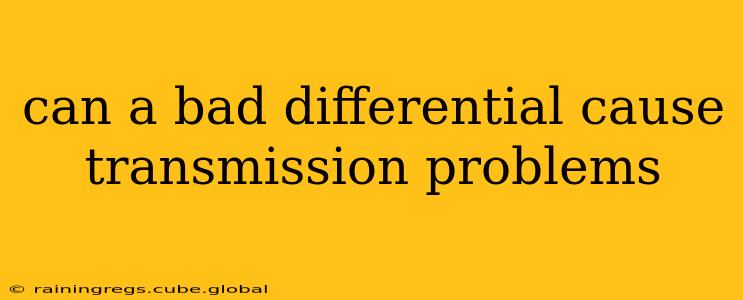Can a Bad Differential Cause Transmission Problems?
The short answer is: yes, but indirectly. A failing differential won't directly damage the transmission's internal components, but problems stemming from a malfunctioning differential can certainly lead to transmission issues. It's a case of cascading failures, where one component's problems create stress on others. Let's explore this further.
How Does a Differential Work?
Before diving into the potential transmission problems, it's helpful to understand the differential's role. The differential is part of your vehicle's drivetrain, responsible for allowing the wheels on an axle to rotate at different speeds. This is crucial when cornering, as the outside wheel needs to travel further than the inside wheel. A healthy differential smoothly manages this speed difference.
What Happens When the Differential Fails?
A failing differential can manifest in several ways, including:
- Whining or grinding noises: These are common signs of worn gears or bearings within the differential.
- Vibrations: A damaged differential can cause noticeable vibrations throughout the vehicle.
- Limited or no drive: In severe cases, the differential may seize up, preventing power from reaching the wheels.
- Uneven tire wear: A malfunctioning differential can cause one wheel to rotate at a different speed than the other, leading to premature and uneven tire wear.
How Differential Problems Can Indirectly Affect the Transmission
While the transmission and differential are separate units, their connection through the driveshaft means problems in one can impact the other. Here's how:
- Increased Stress and Strain: A failing differential forces the transmission to work harder. The increased strain from compensating for the differential's malfunction can overheat the transmission fluid, damage clutches, and accelerate wear on internal components.
- Binding: If the differential is binding or seizing, the transmission may feel resistance, leading to difficulty shifting, rough shifting, or even transmission damage.
- Excessive Vibrations Transferred: Vibrations from a bad differential can be transmitted through the driveshaft to the transmission, potentially causing damage to internal parts over time.
- Fluid Contamination: In some severe cases, a catastrophic differential failure might lead to fluid leaks or contamination, affecting both the differential and transmission fluid.
Can a Bad Differential Cause Transmission Fluid Leaks?
Indirectly, yes. A severe differential failure, such as a complete break in the differential case, could lead to transmission fluid leakage if the leak occurs near the transmission and fluid paths are compromised. However, it's more likely that the leak would originate from the differential itself.
How Can I Prevent Transmission Problems Related to a Bad Differential?
Regular maintenance is key. This includes:
- Regular fluid changes: This is crucial for both the transmission and differential. Fresh fluid lubricates components and removes contaminants.
- Visual inspections: Regularly check for leaks, unusual noises, or vibrations.
- Professional inspections: If you suspect any issues with your differential or transmission, have it inspected by a qualified mechanic. Early detection and repair can prevent major problems down the line.
In conclusion, while a bad differential doesn't directly cause transmission problems, it can create conditions that lead to transmission stress and eventual failure. Addressing differential issues promptly is vital to safeguard the health of your entire drivetrain.
